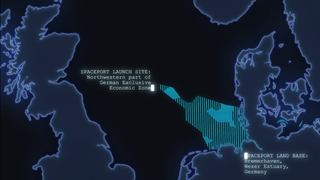
Animation of a mobile launch platform for small launch vehicles from the North Sea © German Offshore Spaceport Alliance
From the North Sea into space: the dawn of a new era in European spaceflight
In our data-based, digitally connected world, we depend on having control over the critical infrastructure in space at any time. Small satellites and the data generated and transferred by them are a key to success. They form the basis for broadband expansion and further digitization, for the ability to judge and act in foreign and security policy, and not least for environmental and climate protection. Disasters such as forest fires and floods can be registered and monitored in real time using satellite-based applications. They also help us to use our scarce resources carefully in an environmentally sound and sustainable manner, for example by applying water, seed and fertilizer to the fields with utmost precision.
Increasing demand for small satellites and small launch vehicles
By 2030 alone, nearly 15,200 satellites will be launched into space worldwide. 90 percent of these satellites will be small satellites. This development is also changing the need for launchers. In the future, there will be a mix of large, medium and small launchers. The ability to deploy small satellites with small launch vehicles, so-called microlaunchers, with pinpoint accuracy is getting more and more important. Up to now, there has been no possibility in continental Europe to launch small satellites flexibly and quickly into space: Satellites from Germany and Europe have to be transported to distant launch sites. A launch platform in the North Sea can change this. Especially start-ups and small and medium-sized enterprises can benefit from the simplified and flexible access to space. The launch platform thus sustainably strengthens the entire NewSpace ecosystem in Germany and Europe. The leverage effect of a launch site should not be underestimated: satellite manufacturers preferably settle near launch sites. For the realization and operation of a launch platform, a private industrial consortium (German Offshore Spaceport Alliance) consisting mainly of medium-sized or family-run companies was formed in 2020. The aim is to carry out launches from the German North Sea by 2023 at the latest.
Launch platform in the North Sea creates independence and new opportunities for Europe
The advantages of a mobile launch platform in the North Sea are impressive: Important polar and sun-synchronous orbits can be reached directly and without any turn manoeuvres - the small launch vehicles fly exclusively over water. Transport and logistics costs are significantly reduced because satellites no longer have to be shipped abroad or overseas for launches. Export licenses to non-EU countries are also completely eliminated.
The launch platform is thus the key system component for launching small satellites from continental Europe into space, operating them and using them for a wide range of social, scientific and economic purposes. It makes an important contribution to ensuring the strategic and digital sovereignty of Germany and Europe in the future. It can usefully supplement the European spaceport in Kourou for large and medium-sized launchers and thus decisively strengthen space travel "Made in Europe".
Space is a future market
In Germany, there is often a discussion about how we can keep value chains, from the idea to the screw to the final product, in our country. Not only German and European NewSpace companies, but industry as a whole would benefit from an integrated value chain: 76 percent of German space companies already have customers from the traditional economy, for example from the logistics and transport sectors, agriculture, the insurance industry, the energy sector or the pharmaceutical industry - with an increasing trend. For example, large industrial companies have their infrastructure monitored from space, car manufacturers network their cars via satellites and the Internet of Things uses fast connections from space. Thanks to the simplified and flexible launch options offered by a launch platform in the North Sea, Germany can not only become considerably more attractive for national and international investments, but also be at the forefront of the global future market space.



